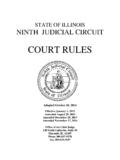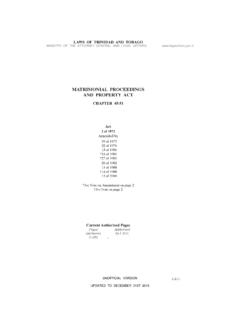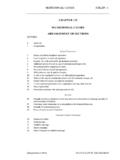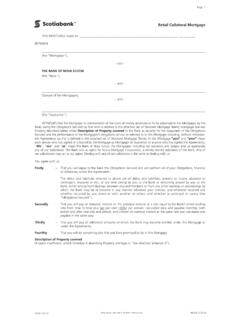Transcription of CONSTITUTIONAL COURT OF SOUTH AFRICA …
1 CONSTITUTIONAL COURT OF SOUTH AFRICA Case CCT 57/12 [2013] ZACC 14 In the matter between: modjadji florah mayelane Applicant and MPHEPHU MARIA NGWENYAMA First Respondent MINISTER FOR HOME AFFAIRS Second Respondent together with WOMEN S LEGAL CENTRE TRUST First Amicus Curiae COMMISSION FOR GENDER EQUALITY Second Amicus Curiae RURAL WOMEN S MOVEMENT Third Amicus Curiae Heard on : 20 November 2012 Decided on : 30 May 2013 JUDGMENT FRONEMAN J, KHAMPEPE J AND SKWEYIYA J 2 FRONEMAN J, KHAMPEPE J AND SKWEYIYA J (Moseneke DCJ, Cameron J and Yacoob J concurring): Introduction [1] This case raises questions about the role that the consent of an existing wife (first wife) in a customary marriage plays in relation to the validity of her husband s subsequent polygynous1 customary marriages. It also deals with the manner in which the content of an applicable rule or norm of customary law should be ascertained and, if necessary, developed in a manner that gives effect to the Bill of Rights.
2 [2] These issues were not central to the disposal of the case in the North Gauteng High COURT , Pretoria (High COURT ) or on appeal in the Supreme COURT of Appeal. It is thus necessary, first, to explain how they came to the fore in the application for leave to appeal before us. Facts and litigation history [3] The main protagonists before us are the applicant (Ms mayelane ) and the first respondent (Ms Ngwenyama). The Minister for Home Affairs is the second respondent. She played no active part in the proceedings and abides by the decision of this COURT . The Women s Legal Centre Trust (first amicus), the Commission for Gender Equality 1 Polygyny is polygamy in which a man has more than one wife as compared to polyandry which is polygamy in which a woman has more than one husband.
3 Concise Oxford English Dictionary 11 ed, revised (Oxford University Press, Oxford 2009). FRONEMAN J, KHAMPEPE J AND SKWEYIYA J 3 (second amicus) and the Rural Women s Movement (third amicus) were admitted as friends of the COURT . [4] Ms mayelane alleges that she concluded a valid customary marriage with Hlengani Dyson Moyana (Mr Moyana) on 1 January 1984. Ms Ngwenyama alleges that she married Mr Moyana on 26 January 2008. Mr Moyana passed away on 28 February 2009. Both Ms mayelane and Ms Ngwenyama subsequently sought registration of their respective marriages under the Recognition of Customary Marriages Act2 (Recognition Act). Each disputed the validity of the other s marriage. Ms mayelane then applied to the High COURT for an order declaring her customary marriage valid and that of Ms Ngwenyama null and void on the basis that she (Ms mayelane ) had not consented to it.
4 The High COURT granted both orders. Ms Ngwenyama took the matter on appeal to the Supreme COURT of Appeal. That COURT confirmed the order declaring Ms mayelane s customary marriage valid, but overturned the order of invalidity in relation to Ms Ngwenyama s customary marriage. It found the latter customary marriage to be valid as well. Ms mayelane now seeks leave to appeal against this latter part of the Supreme COURT of Appeal s order. [5] Although Ms mayelane alleged in her founding papers in the High COURT that Xitsonga customary law required her consent for the validity of her husband s subsequent customary marriage and that she had never consented to his marriage to Ms Ngwenyama, 2 120 of 1998. FRONEMAN J, KHAMPEPE J AND SKWEYIYA J 4 this issue was not considered by either the High COURT or the Supreme COURT of Appeal.
5 Both Courts determined the matter by interpreting and applying section 7(6) of the Recognition Act3 and therefore did not consider it necessary to have regard to Xitsonga customary law on the issue of [6] The High COURT interpreted section 7(6) as creating an obligatory requirement for the validity of a subsequent customary marriage and held that, if the husband fails to obtain COURT approval of the written contract regulating the matrimonial property regime of the subsequent marriage, that marriage is The Supreme COURT of Appeal disagreed and found that the requirements for validity of customary marriages are to be found in section 3 of the Recognition Act6 and that the consequences of non-compliance with section 7(6) were adequately met by treating subsequent customary marriages as being marriages out of community of In other words, the Supreme COURT of Appeal found that section 7(6) of the Recognition Act does not relate to the validity of customary marriages, but to the proprietary consequences thereof.
6 [7] By treating section 7(6) as a requirement for the validity of subsequent customary marriages, the High COURT found it unnecessary to deal with the other ground for the 3 See [31] below for the text of section 7(6). 4 MG v BM and Others 2012 (2) SA 253 (GSJ) (High COURT judgment) at paras 21-5 and MN v MM and Another 2012 (4) SA 527 (SCA) (Supreme COURT of Appeal judgment) at para 11. 5 High COURT judgment above n 4 at paras 24-5. 6 See [28] below for text of section 3(1). 7 Supreme COURT of Appeal judgment above n 4 at paras 37-8. FRONEMAN J, KHAMPEPE J AND SKWEYIYA J 5 alleged invalidity of Ms Ngwenyama s customary marriage (that is, the failure to procure Ms mayelane s consent in relation thereto). Although the consent issue was argued as an alternative in the Supreme COURT of Appeal, that COURT did not consider it necessary to deal with the question.
7 The COURT reasoned that there was no cross-appeal challenging the High COURT s finding on its acceptance of the validity of the second customary marriage. 8 [8] This COURT directed the parties to address in written argument the question of whether a cross-appeal was necessary to deal with the consent issue and the consequences if it was not. If a cross-appeal was not necessary, the Supreme COURT of Appeal should have determined the consent issue. [9] In her founding papers in the High COURT Ms mayelane stated that Xitsonga customary law requires the consent of the first wife for the validity of a husband s subsequent customary marriages and that she was never informed nor asked by her husband to consent, nor provided any consent, to his alleged customary marriage to Ms Ngwenyama.
8 Ms mayelane s brother-in-law (her deceased husband s brother) corroborated this under oath. Ms Ngwenyama did not deny these allegations, but sought to establish the validity of her own marriage to Mr Moyana by denying that Ms mayelane was ever married to him and by stating that ilobolo negotiations were entered into in relation to her own marriage. 8 Id at para 11. FRONEMAN J, KHAMPEPE J AND SKWEYIYA J 6 [10] Ms mayelane pointed out in the High COURT that the documents to prove the validity of Ms Ngwenyama s marriage were not attached to her affidavit and that this, coupled with the failure to challenge Ms mayelane s legal assertion regarding the content of Xitsonga customary law and her factual assertion regarding her lack of consent to the marriage, was sufficient evidence to decide the matter in Ms mayelane s favour.
9 [11] Ms Ngwenyama and the amici opposed this approach, mainly on the basis that there was insufficient evidence to establish the proper content of the alleged customary rule. They contended that, from available formal sources in the legal literature, it is not clear whether, or to what extent, consent is a requirement for the validity of a subsequent marriage in Xitsonga customary law. In particular, they emphasised that there is a dearth of information on what the personal and proprietary consequences of non-compliance with any requirement of that kind may be. Issues [12] The material issues for determination are: a) Should the consent issue have been determined by the Supreme COURT of Appeal? b) Is the consent of a first wife necessary for the validity of her husband s subsequent customary marriage?
10 This entails considering FRONEMAN J, KHAMPEPE J AND SKWEYIYA J 7 (i) whether the Recognition Act directly prescribes the first wife s consent as a requirement for validity; and (ii) whether living Xitsonga custom makes such a prescription. c) If neither the express provisions of the Recognition Act nor Xitsonga customary law creates this requirement, does the Constitution require the law to be developed? Approach [13] We intend to deal with the issues in the following manner. The parties contentions will be set out in summary before dealing briefly with the question whether leave to appeal should be granted. We conclude that leave must be granted. The merits of the appeal are initiated by discussing whether a cross-appeal was necessary in the Supreme COURT of Appeal in order for the issue of consent to be considered.

















